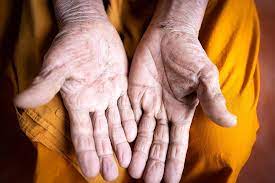Seniors and Skin Health  It’s very important that the elderly take care of their skin because they are more susceptible to skin infection and skin disease due to the changes that take place to skin as we age. It becomes less supple, thinner and dryer. It injures easier and heals more slowly. As a result, seniores are prone to skin problems ranging from itching, scaling and mild dryness to grave skin conditions such as infection and ulcerations. A severe skin infection or non-healing wound in the elderly can be very serious, even fatal. Common skin conditions of the elderly: Senile Purpura – are the purplish sports that appear most often on the arms and legs due to thinness of the elder person’s skin and frailty of the capillaries and blood vessels just below the surface. Stasis Dermatitis – is more common in elderly women than men; it is characterized by dry, itchy skin. Exfoliative Dermatitis – is more severe form of dermatitis than stasis dermatitis and is characterized by excessive peeling and shedding of skin. It is of particular concern in the elderly because the severe itching can lead to infections.  Skin infections/Infestations – bacterial infections and parasitic infestation such as scabies or ringworm are common in the elderly. Cancerous and noncancerous skin growths. Viral skin disorders – such as shingles and herpes zoster. In general, the elderly have special skin care needs because aging skin is so thin and dry. If it becomes too dry, it is prone to cracking and dermatitis, which allows for penetration of bacteria that can result in infection. The elderly should:
 To promote good skin health, seniors should also:
(Aged Care New Zealand, Issue 01 2022, pg. 83) Comments are closed.
|
AuthorShonagh O'Hagan Archives
July 2024
|

 RSS Feed
RSS Feed